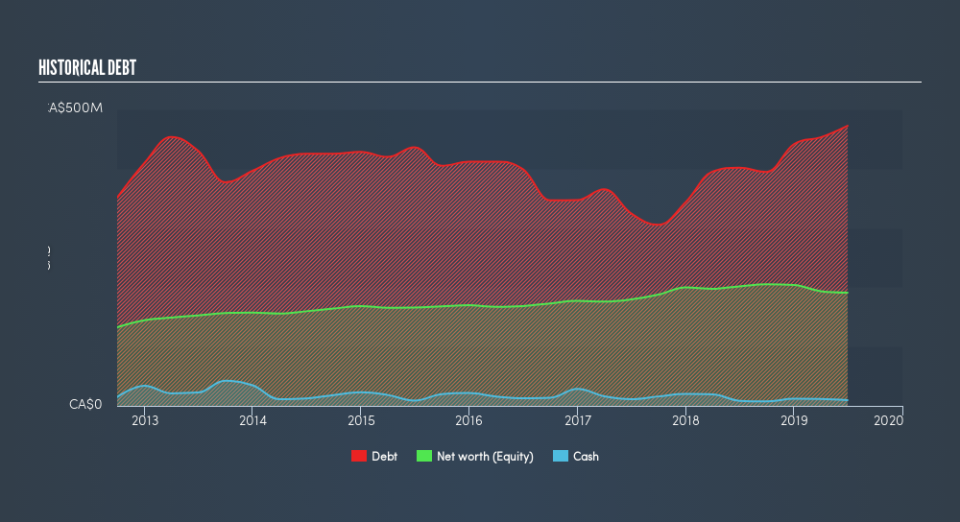Rocky Mountain Dealerships (TSE:RME) Has A Mountain Of Debt

The external fund manager backed by Berkshire Hathaway's Charlie Munger, Li Lu, makes no bones about it when he says 'The biggest investment risk is not the volatility of prices, but whether you will suffer a permanent loss of capital.' So it might be obvious that you need to consider debt, when you think about how risky any given stock is, because too much debt can sink a company. We note that Rocky Mountain Dealerships Inc. (TSE:RME) does have debt on its balance sheet. But the real question is whether this debt is making the company risky.
When Is Debt A Problem?
Debt is a tool to help businesses grow, but if a business is incapable of paying off its lenders, then it exists at their mercy. Ultimately, if the company can't fulfill its legal obligations to repay debt, shareholders could walk away with nothing. However, a more frequent (but still costly) occurrence is where a company must issue shares at bargain-basement prices, permanently diluting shareholders, just to shore up its balance sheet. Of course, the upside of debt is that it often represents cheap capital, especially when it replaces dilution in a company with the ability to reinvest at high rates of return. When we think about a company's use of debt, we first look at cash and debt together.
See our latest analysis for Rocky Mountain Dealerships
How Much Debt Does Rocky Mountain Dealerships Carry?
As you can see below, at the end of June 2019, Rocky Mountain Dealerships had CA$501.3m of debt, up from CA$402.3m a year ago. Click the image for more detail. And it doesn't have much cash, so its net debt is about the same.
A Look At Rocky Mountain Dealerships's Liabilities
We can see from the most recent balance sheet that Rocky Mountain Dealerships had liabilities of CA$506.1m falling due within a year, and liabilities of CA$52.6m due beyond that. Offsetting this, it had CA$9.91m in cash and CA$23.6m in receivables that were due within 12 months. So its liabilities total CA$525.2m more than the combination of its cash and short-term receivables.
This deficit casts a shadow over the CA$138.8m company, like a colossus towering over mere mortals. So we definitely think shareholders need to watch this one closely. After all, Rocky Mountain Dealerships would likely require a major re-capitalisation if it had to pay its creditors today.
We measure a company's debt load relative to its earnings power by looking at its net debt divided by its earnings before interest, tax, depreciation, and amortization (EBITDA) and by calculating how easily its earnings before interest and tax (EBIT) cover its interest expense (interest cover). Thus we consider debt relative to earnings both with and without depreciation and amortization expenses.
Rocky Mountain Dealerships shareholders face the double whammy of a high net debt to EBITDA ratio (12.1), and fairly weak interest coverage, since EBIT is just 2.1 times the interest expense. This means we'd consider it to have a heavy debt load. Even worse, Rocky Mountain Dealerships saw its EBIT tank 20% over the last 12 months. If earnings keep going like that over the long term, it has a snowball's chance in hell of paying off that debt. When analysing debt levels, the balance sheet is the obvious place to start. But ultimately the future profitability of the business will decide if Rocky Mountain Dealerships can strengthen its balance sheet over time. So if you're focused on the future you can check out this free report showing analyst profit forecasts.
Finally, a business needs free cash flow to pay off debt; accounting profits just don't cut it. So the logical step is to look at the proportion of that EBIT that is matched by actual free cash flow. During the last three years, Rocky Mountain Dealerships produced sturdy free cash flow equating to 55% of its EBIT, about what we'd expect. This cold hard cash means it can reduce its debt when it wants to.
Our View
On the face of it, Rocky Mountain Dealerships's EBIT growth rate left us tentative about the stock, and its level of total liabilities was no more enticing than the one empty restaurant on the busiest night of the year. But on the bright side, its conversion of EBIT to free cash flow is a good sign, and makes us more optimistic. After considering the datapoints discussed, we think Rocky Mountain Dealerships has too much debt. That sort of riskiness is ok for some, but it certainly doesn't float our boat. Given the risks around Rocky Mountain Dealerships's use of debt, the sensible thing to do is to check if insiders have been unloading the stock.
If, after all that, you're more interested in a fast growing company with a rock-solid balance sheet, then check out our list of net cash growth stocks without delay.
We aim to bring you long-term focused research analysis driven by fundamental data. Note that our analysis may not factor in the latest price-sensitive company announcements or qualitative material.
If you spot an error that warrants correction, please contact the editor at editorial-team@simplywallst.com. This article by Simply Wall St is general in nature. It does not constitute a recommendation to buy or sell any stock, and does not take account of your objectives, or your financial situation. Simply Wall St has no position in the stocks mentioned. Thank you for reading.

